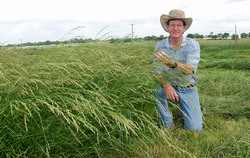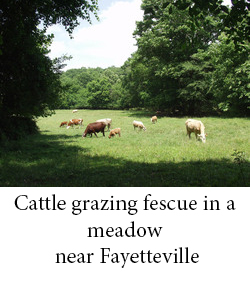Non-toxic fescue endophytes to benefit livestock producers

Professor Chuck West shows a test plot of non-toxic
endophyte infected fescue at the University of Arkansas System's
Division of Agriculture research and extension center in Fayetteville.
Contact Information:
Charles P. West, Dept. of Crop, Soil, and Environmental Sciences
479-575-3982, cwest@uark.edu
Nathan McKinney, Technology Licensing Officer
479-575-6951, nmckinne@uark.edu
By Howell Medders, Communications, Division of Agriculture
479-575-5647, hmedders@uark.edu.

FAYETTEVILLE, Ark. — Four recently patented non-toxic strains of a fungal organism called an endophyte discovered by University of Arkansas Professor Charles West and Professor Emeritus Edgar Piper could provide significant benefits to livestock producers in the "fescue belt," which includes Arkansas and neighboring states.
The patents resulted from research by West and Piper as University of Arkansas System Division of Agriculture scientists in cooperation with fescue breeder David Sleper at the University of Missouri. West is in the department of crop, soil and environmental sciences. Piper is retired from the department of animal sciences.
Tall fescue is a cool-season grass relied on by most Arkansas and Missouri beef cattle producers as a fall, winter and spring forage and hay crop. The .dominant variety since the 1950s has been Kentucky 31 thanks to its ability to survive drought and persist for many years, West said.
KY31 fescue is infected by an endophyte that makes it resistant to insect pests and tolerant of drought conditions. However, the endophyte produces a toxic alkaloid in the grass, which lowers calving rates and weight gain in livestock.
The recently patented endophyte strains are described as non-toxic because they do not cause fescue toxicity in cattle, but they still provide the benefits of pest resistance and drought tolerance, which help the grass persist as a forage crop, West said.
Field tests have shown that fescue infected with any of the patented strains is as persistent during summer droughts as KY31, West said. Cattle performance trials with three of the patented endophytes showed that the infected fescue plants did not cause fescue toxicosis symptoms, he added.
Field tests were conducted at the Division of Agriculture's Arkansas Agricultural Research and Extension Center in Fayetteville, at the Southwest Research and Extension Center at Hope and at the Livestock and Forestry Research Station near Batesville.
"Our data show that the cost of about $100 per acre to renovated a KY31 fescue pasture with a new variety that is infected by a non-toxic endophyte can be recovered in about two years of returns from better herd performance," West said.
"This is really green technology, in every sense," West said. A persistent and high-quality cool-season forage crop will reduce the need to feed grain and other supplements to cattle, he said.
No genetic transformation was conducted to develop the patented endophyte strains, West said. They were identified by a rigorous process over about 12 years of collecting and testing hundreds of naturally occurring endophytes. The patented strains and others with similar characteristics were collected by West from plants found growing in meadows and pastures in the Mediterranean region.
Cattle producers currently balance cool-season forage crops between those that provide either quality or persistence, West said. Higher quality cool-season grasses include annuals such as ryegrass or low-persistence perennials, such as endophyte-free fescue.
"This technology allows seed companies to provide high quality fescue varieties that also have the stand persistence not found in endophyte-free fescues," West said.
Several seed companies have expressed interest in commercial licensing rights to the patented endophytes, West said. One or more new varieties of non-toxic endophyte infected fescue could be available by 2010 in small quantities and widely available by 2011, he added.
Fescue varieties infected by non-toxic endophytes discovered by scientists in New Zealand are currently marketed. New varieties infected by the Arkansas endophytes will give producers more choices of varieties with a range of genetic traits, West said. Seed companies interested in licensing the patented endophytes may contact Nathan McKinney at the University of Arkansas Technology Licensing Office.